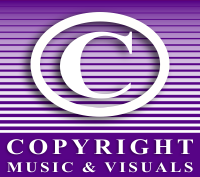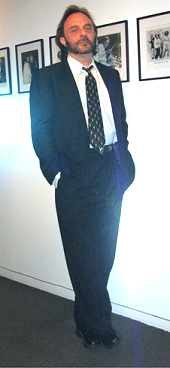Reprinted from PLAYBACK - Canada's Broadcast & Production Journal October 11, 1993 - And still a good guide today.

John Ciccone is founder and president of Copyright Music & Visuals, Toronto, specializing in music consulting and copyright clearance for film, TV, advertising and multimedia.
COPYRIGHT CLEARANCE
Common Questions
& Myths
JOHN CICCONE, whose expertise on copyright issues has been utilized by clients such as the CBC and the Arts & Entertainment Network and Broadway Video provides an overview on common clearance issues.
The focus here will be on music use; although film footage clearance is touched upon. This is not intended to be a complete study of copyright. Laws and the industry change, and each situation is unique – with its own set of problems, questions and governing laws.
UNDERSTANDING the worlds of publishers, record companies, agents and unions can help a producer deal with surprises (a pleasant word for catastrophe).
Much has been written about how to approach copyright clearance – types of licenses required, etc., but little has explained why things happen the way they do.
First, a brief recap of some licensing rules. If you know them, skip down to "How Many Bars Can I Use...".
Set within a common scenario, a director in latter stages of post production (the really rushed part) pulls a CD off a shelf and finds that it works beautifully with the visuals. The CD is a recording released by a popular band. The director may fall prey to Myth #1: I’ll just get an OK from the record company and all will be well, right? Wrong. A ‘bundle of rights’ must be addressed.
Right in the Composition:
The first step is to clear the right to reproduce the musical composition. The composer(s) may very well have nothing to do with the band on the recording, and subsequently, nothing to do with the record company. Without this clearance, referred to as a "synchronization license" in the case of soundtracks for film, video, etc., no reproduction can be legally made.
The popular band also had to get permission to record the composition too, a "mechanical license". This right is normally assigned to a publisher to take care of the administration, promotion, etc. for the composer. Know that administration control is ever-changing. Copyright is bought and sold frequently.
Performing Right:
Also, the right to perform the composition (including broadcasts, theatrical showings, etc.) is usually assigned to and administered by Performing Rights Societies (SOCAN in Canada, ASCAP and BMI in the U.S., etc.) after receiving music cue sheets from producers (this area can get a bit tricky since "grand rights" – a type of performing right if you will – are administered by the publisher).
IMPORTANT TIP: theatrical performances are not currently looked after by Performing Rights Societies in the U.S. as they are in most other countries. So, if your feature film is screened there, you’ll probably want to have the performing right for U.S. theatrical use included in your "synch license" from the composer/publisher.
(On a related matter, simply performing a song live to an audience – not synchronizing it with visuals – might already be taken care of by the venue. But in the same situation you must obtain a clearance if you, for example, modify the lyrics.)
Moral Right:
Further, and especially when dealing with British and (recently) amended Canadian law, the composer always maintains the moral right in the composition. This allows the creator of the work to protect its ‘artistic integrity’ and guards against its distortion or mutilation (frighteningly subjective, yes?).
It also allows the creator of the work to control whether the work is associated with commercials or product endorsements. This right is not assignable although it can be waived and only waived by the composer.
Master Use:
Now to make a dub from the above-mentioned CD, a "master use" license must also be obtained. This grants the right to reproduce the recording (separate the composition from the recording in your mind and you’ll be way ahead). This often comes from the record company.
Union/Guild New-use:
At this stage, unions or guilds which the band on the recording belong to will usually want a "new-use" fee paid to their members. Not a big deal if the session involved a couple of folks on samplers – but what about the artists who have a 110 piece philharmonic orchestra backing them up? This is not outlined in the Copyright Act but is considered to be a customary industry issue. When the producer has musicians re-record the composition, the master use license and new-use fees are eliminated and replaced by the usual studio and musician hiring costs.
Sound-alike:
So the producer and director are in the studio with the musicians and decide that creatively, the track should have the same feel as the recording. This brings up the "sound-alike" issue. Now famous court cases in the U.S. have ruled in favour of artists like Tom Waits and Bette Midler who have claimed that their distinctive vocal styles were plainly misappropriated by producers. This is a 'clearance' normally administered by a personal manager, agent or lawyer representing the performing artist (we're no longer dealing with composers and record labels for this) and is a critical issue when dealing with advertisements, product tie-ins, etc.
How many bars of a song can I use without having to get permission?
Contrary to what you may have heard, there is no set amount. If it got to court, it would likely come down to a subjective yet complex decision as to whether the composer's work was reproduced and a substantial amount of it used based on a small parade of blackboards and tape recorders.
I need to know if I can and how much... right away.
Who doesn’t? It is seemingly a natural law of production that by the time you know what you need you have little time to get it. With insight into the industry, tabs on ever-changing copyright ownership, and good fortune, things can move surprisingly quickly. However, we can also be at the mercy of reality.
To understand that reality, picture this: a composer is signing a deal with a publisher. If that composer has negotiating strength, he/she may try to get ‘third party approval’ meaning that any licensed use of their song must get their express approval or veto without even having to provide a reason. Factor in that it is not uncommon for any number of publishers or other entities to all own shares in the song. That deal may also require that each of those entities give their express consent. Now factor in that one of these contractually bound people is hot-air ballooning in France without a phone and you have your proverbial wrench.
Remember the operative words: "contractually bound". No one will risk getting sued. They also won’t want to lose their financial interest in the copyright and develop a bad reputation preventing them from obtaining future copyright interests. Odds are that they’d rather risk losing the business from this one license.
Everyone wants to do business (although sometimes you gotta shake your head and wonder). But as in all business, desk pounding can do more to sway the other side to simply say, "Next time please start earlier", and leave you with nothing. After all, a big company likely has a stack of requests like ours on their desk that they can move on to. Rest assured that licenses worth tens of thousands of dollars and more sometimes just never materialize due to the above risk elements.
Name of the Game:
So what's the solution? The key is to know the game. (If the people in charge of your clearance are worth their salt, they will also be equipped to deal with the splits, shifts and phone/fax tag). Know the players involved, how they do their business and subsequently how to help get your information rapidly.
The next single-most important thing is to arm yourself with alternatives. Example: your ’60s psychedelia rock tune is unavailable, taking forever or priced too high. Well gee, if there isn’t a creative reason to use that one specific song, MCA Publishing currently has 100% internal control of some Steppenwolf compositions and they’ve been sensitive to justifiable budget restraints. A strong understanding of music genres from Mozart to Motown to Motorhead is required in order to fit the aesthetic piece into the puzzle.
The cost:
How much it will cost is completely negotiable (unless there exists a statutory rate such as that for mechanical licenses in the U.S.). It will be based on the popularity of the song, the type of use in the production, the territory of use, the term of the license, exposure, promotional value, the general pricing policies of the copyright owners, and so on. Put a bit of thought into the many potential combinations of these terms to make your budget work.
The licensor’s guidelines will also determine availability and what types of use will be allowed. While some have loose rules if any, others can be tough. For example, permission has apparently never been granted to change Beatle lyrics (known as ‘parody lyrics’) or maybe the owners of an older, ‘serious’ ballad might not share our concept of what makes good comedy.
I'm a Friend of the Band:
These are dangerous waters. Many well-meaning musicians have pledged their songs only to be reminded that they legally don’t have the last word in licensing. In the earlier example, the negotiating composer may have to accede to the publisher’s final say in availability and price in order to reap other benefits.
In some cases, trying to go directly to the composer can leave a publisher or record company feeling "end-run" and bitter. (They might be frustrated that they’re not able to do what they were hired to do and may regret forking over an advance to the composer.) So you’ve gone full circle to the one who calls the shots and now they’re cranky.
Copyright is complex enough to confuse even the creators of the work.
Finally, copyright is complex enough to confuse even the creators of the work who might not fully comprehend what you require. Artists’ involvement can help a project. But it must be approached tactfully.
I've got a Russian recording. Do I have to clear it?
I’m not sure why this one keeps coming up. It likely has its roots in the fact that ‘Russia’ at one time was not signatory to our copyright convention.
This is still a property which someone owns. Whether the owner can easily take action against the unlicensed user is a highly technical area but shouldn’t be a consideration. Also, there is still that separate composition and perhaps other rights embodied in that recording.
It's an old song. Isn't it Public Domain?
Many countries have many different "terms of copyright". In Canada, it’s currently 50 years after the death of the last surviving composer of the song...but there can be exceptions (e.g.: unpublished works; "posthumous" works; etc.). Revisions in the U.S. Act affect, and can lengthen through renewals, the term of copyright. This term can vary from country to country. So it’s highly conceivable that a composition might be PD in one country while not in another.
Doing a "registrations and renewals" search through the U.S. Library of Congress and/or equivalent government areas of other countries can shed light on this area. Records and photographs can go PD fifty years after the pressing of the first plates or negatives, but again can be subject to exceptions.
I bought Stock Film footage from a stock library. Is it all cleared?
Look very carefully at your license from the stock house. It is most customary that you are only licensing the copyright in the film footage itself. This does not necessarily encompass the many elements in the film such as actors’ rights, union rights, directors’ rights, writers’ rights, copyright in an underlying work (e.g.: a play or book), etc. As for any music in the soundtrack, all the usual copyrights mentioned earlier can apply to that element alone.
One last tip for the road:
Remember that the title of a song is not copyright protected. Consequently, there can be a gazillion songs called Please Don’t Leave Me Darling. The distinguishing factor (aside from the music itself) is the composer. So to research the right song, we start with the correct title and the composer(s). There are many, many variables in the copyright clearance world. Familiarizing yourself with the landscape, starting as early as possible and arming yourself with options can help negotiate the tricky ground and spin into a successful production.
Reprinted from PLAYBACK - Canada's Broadcast & Production Journal October 11, 1993 - And still a good guide today.





